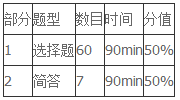摘要:
AP chem考试形式:第一部分为60道选择题,耗时90min,主要考察AP chem所要求掌握的知识原理及应用。第二部分为简答题,其中3道长简答和4道短简答,内容涉及实验设计、数据分析、观察并解释现象等。
关于AP考试
AP课程涵盖30多门学科,难度与同等大学课程相当,在全世界范围内有60多个国家多大1000多所高校承认AP的考试成绩并提供想对等的学分,为还处在高中阶段的学有余力的学生提供了提前获得学分的机会。
关于AP chem 考试
相比于国内高中化学,AP
chem在深度和广度上都有不少提升,所以如果你是国内普通全日制高中生且打算考取AP化学,那么应该做好下大力气的准备。而如果你是国际学校的学生,基本要求就是按照学校的课程要求完成平时的课程练习并在考前留出足够多的时间来进行强化和复习。
AP chem考试形式
第二部分为简答题,其中3道长简答和4道短简答,内容涉及实验设计、数据分析、观察并解释现象等。 第一部分为60道选择题,耗时90min,主要考察AP chem所要求掌握的知识原理及应用。
另外,在简答题部分可以使用计算器;在全部两个考试部分中都提供元素周期表、常用公式以及常用常数。
AP选择题部分由机器判卷而free response
部分由人工判卷,最后二者结合形成1-5分五档。一般来讲,5分对应大学的A,4分对应A-、B+、B,3分对应B-、C+和C。其中低于3分的成绩不被认为是有用的成绩。
|
AP
Score
|
Qualification
|
|
5
|
Extremely
well qualified
|
|
4
|
Well
qualified
|
|
3
|
Qualified
|
|
2
|
Possibly
qualified
|
|
1
|
No
recommendation
AP考试知识分布点
|
Topics
and percentage
|
contents
|
|
Reactions
(35-40%)
|
Reaction
types
|
-
Acid-base
reactions; concepts of Arrhenius, Br?nsted-Lowry, and Lewis; coordination
complexes; amphoterism
-
Precipitation
reactions
-
Oxidation-reduction
reactions
a. Oxidation number
b. The role of the electron in
oxidation-reduction
c. Electrochemistry: electrolytic and galvanic
cells; Faraday's laws; standard half-cell potentials; Nernst equation;
prediction of the direction of redox reactions
|
|
Stoichiometry
|
-
Ionic
and molecular species present in chemical systems: net ionic equations
-
Balancing
of equations including those for redox reactions
-
Mass
and volume relations with emphasis on the mole concept, including empirical
formulas andlimiting reactants
|
|
Equilibrium
|
-
Concept
of dynamic equilibrium, physical and chemical; Le Chatelier's principle;
equilibrium constants
-
Quantitative
treatment
a. Equilibrium constants for gaseous reactions: Kp, Kc
b.
Equilibrium constants for reactions in solution
(1) Constants for acids and
bases;pK; pH
(2) Solubility product constantsand their application to
precipitation and the dissolution of slightly soluble compounds
(3) Common
ion effect; buffers;hydrolysis
|
|
Kinetics
|
-
Concept
of rate of reaction
-
Use
of experimental data and graphical analysis to determinereactant order, rate
constants, and reaction rate laws
-
Effect
of temperature change on rates
-
Energy
of activation; the role ofcatalysts
-
The
relationship between the rate-determining step and a mechanism
|
|
Thermodynamics
|
-
State
functions
-
First
law: change in enthalpy;heat of formation; heat of reaction; Hess's law; heats
of vaporization and fusion;calorimetry
-
Second
law: entropy; free energy of formation; free energy of reaction; dependence of
change in free energy on enthalpy and entropy changes
-
Relationship
of change in free energy to equilibrium constants and electrode
potentials
|
|
Topics
and percentage
|
contents
|
|
Descriptive
Chemistry (10-15%)
|
Chemical
reactivity and products of chemical reactions
|
|
Relationships
in the periodic table: horizontal, vertical, and diagonal with examples from
alkali metals, alkaline earth metals, halogens, and the first series of
transition elements
|
|
Introduction
to organic chemistry: hydrocarbons andfunctional groups (structure,
nomenclature, chemical properties). Physical and chemical properties of simple
organic compounds should also be included as exemplary material for the study of
other areas such as bonding, equilibria involving weak acids, kinetics,
colligative properties, and stoichiometric determinations of empirical and
molecular formulas.
|
|
Topics
and percentage
|
contents
|
|
Laboratory
(5-10%)
|
making
observations of chemical reactions and substances; recording data; calculating
and interpreting results based on the quantitative data obtained;
and communicating effectively the results of experimental
work.
|
|
更多相关的AP化学资料,请点击:AP化学频道。
